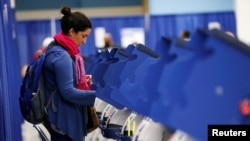ວັນແຫ່ງຄວາມສະເໝີພາບຂອງແມ່ຍິງໃນວັນອາທິດມື້ອື່ນນີ້ ຈະແມ່ນວັນຄົບຮອບປີທີ
98 ຂອງບົດແກ້ໄຂລັດຖະທຳມະນູນ ຂໍ້ທີ 19 ຊຶ່ງໃຫ້ສິດແກ່ພວກແມ່ຍິງ ໃນການປ່ອນ
ບັດລົງຄະແນນສຽງ ຢູ່ໃນສະຫະລັດ.
ນັບຕັ້ງແຕ່ນັ້ນມາ ພວກແມ່ຍິງກໍໄດ້ພາກັນໄປປ່ອນບັດ ລື່ນພວກຜູ້ຊາຍ ເປັນຈຳນວນ
ຫຼວງຫຼາຍ.
ໃນປີ 2016 ຜ່ານມານີ້ ລາຍງານແຈ້ງວ່າ ມີພວກແມ່ຍິງ 73 ລ້ານ 7 ແສນຄົນ ໄດ້ພາ
ກັນໄປປ່ອນບັດ ທຽບໃສ່ພວກຜູ້ຊາຍ 63 ລ້ານ 8 ແສນຄົນ ອີງຕາມຂໍ້ມູນສູນກາງສຳ
ລັບແມ່ຍິງອາເມຣິກັນ ທີ່ພົວພັນໃນການເມືອງ ຫຼື CAWP.
ແຕ່ແນວໃດກໍຕາມ ອຸບປະສັກແມ່ນຍັງມີຢູ່.
ໃນຂະນະທີ່ພວກແມ່ຍິງ ມີໜ້າເພີ້ມຂຶ້ນຢ່າງຫຼວງຫຼາຍໃນການໄປປ່ອນບັດຂອງພວກ
ເຂົາເຈົ້າໃນຮອບຫຼາຍໆທົດສະວັດຜ່ານມາ ແຕ່ການສຶກສາສະແດງໃຫ້ເຫັນວ່າ ພວກ
ເຂົາເຈົ້າຍັງມີໜ້າບໍ່ພຽງພໍ ໃນຫຼາຍໆຂົງເຂດວຽກງານ ຮວມທັງ ໃນລັດຖະບານ ວິຊາ
ຊີບດ້ານເທັກນິກ ແລະໂລກຂອງບັນດາບໍລິສັດ.
ຂໍ້ມູນຈາກສະຫະພັນສະພາ ລະຫວ່າງປະເທດ ຫຼື IPU ສະແດງໃຫ້ເຫັນວ່າ ມີສະມາ
ຊິກສະພາທີ່ເປັນແມ່ຍິງ ປະມານ 1 ໃນທຸກ 4 ຄົນໃດ ຢູ່ໃນທົ່ວໂລກ.
ສຳລັບສະຫະລັດແລ້ວ ແມ່ຍິງປະກອບເປັນພຽງແຕ່ 25.4 ເປີເຊັນ ຂອງສະມາຊິກສະ
ພາປະຈຳລັດ ແລະເປັນພຽງແຕ່ 20 ເປີເຊັນ ຂອງລັດຖະສະພາສະຫະ ລັດ ອີງຕາມຂໍ້
ມູນຂອງກຸ່ມຈັດຕັ້ງແມ່ຍິງແຫ່ງຊາດຂອງພັກເດໂມແຄຣັດ.
ສ່ວນຢູ່ໃນໂລກຂອງບໍລິສັດຕ່າງໆນັ້ນ ໃນໝູ່ບັນດາບໍລິສັດ ທີ່ປະກອບເປັນກຸ່ມ S&P
500 ມີພຽງແຕ່ 25 ບໍລິສັດ ຫຼື 5 ເປີເຊັນເທົ່ານັ້ນ ທີ່ມີແມ່ຍິງເປັນຜູ້ນຳພາ.
Women's Equality Day on Sunday marks the 98th anniversary of the 19th Amendment, which gave women the right to vote in the United States.
Since then, women who have mostly outnumbered men at the polls.
In 2016, 73.7 million women reported voting compared with 63.8 million men, according to data by the Center for American Women in Politics (CAWP).
Yet many obstacles remain.
While women have greatly increased their presence in the voting booth over the past several decades, studies show they still are under-represented in many areas, including government, tech jobs and the corporate world.
Data from the Inter-Parliamentary Union (IPU), the international organization of parliaments, shows that only about 1 in 4 parliamentarians worldwide is a woman.
In the United States, women make up just 25.4 percent of the proportion in state legislatures andjust 20 percent of the U.S. Congress, according to data by the national Democratic women's group, Emily's List.
In the corporate world, among the S&P 500 companies, only 25 -- or 5 percent -- are led by women.
While there is still more gender equality to achieve, the recent #MeToo movement against sexual harassment and assault has greatly increased awareness of gender equality, said Lorraine Hariton, who was named this week as the new leader of the advocacy group Catalyst. The group is one of the oldest organizations dedicated to promoting women in the workplace.
Earlier this week ((Monday)), Hariton told reporters she has not seen such levels of gender equality awareness since she began her business career at IBM in the 1970s. She has been the CEO at two tech startups, Beatnik and Apptera.
The #MeToo movement has inspired changes, including a surge in the number of women who have filed to run in both houses of the U.S. Congress. For the 2018 midterm elections, 54 women filed to run for the U.S. Senate, 476 filed to run for the U.S. House, according to CAWP. Of the number of women who filed for those offices, 72 percent identified as Democrats.
As women running for public office in never-before-seen numbers, a recent poll by Pew Research Center shows that Americans are mostly happy about it.
Without specifying their political party affiliations, the poll also found that 39 percent of the participants polled believed Congress would fare better with more women in it. Only 7 percent said it would be a bad idea, while 53 percent said that gender would have no effect on how Congress performs.
But the findings show a remarkable difference in how Democrats and Republicans feel about women running for Congress.
A whopping 80 percent of Democrats think it's a "good thing" that women are running. That is in stark contrast to 39 percent of Republicans who said the same thing.
Another 50 percent of Republicans polled said that it was "neither a good nor bad thing" that women in the country were running for public office, and 10 percent responded it was a "bad thing."
President Donald Trump said in statement Friday, "We all benefit from the leadership and ingenuity of women in education, medicine, government, law, business, military service, and every other field contributing to the greatness of this nation."
He also touted his own policies to help women, which included doubling the child tax credit and adding a tax credit for day care payments. He said his budget this year would include a proposal for a national paid parental leave program as it did last year, and called on Congress to pass the measure.




